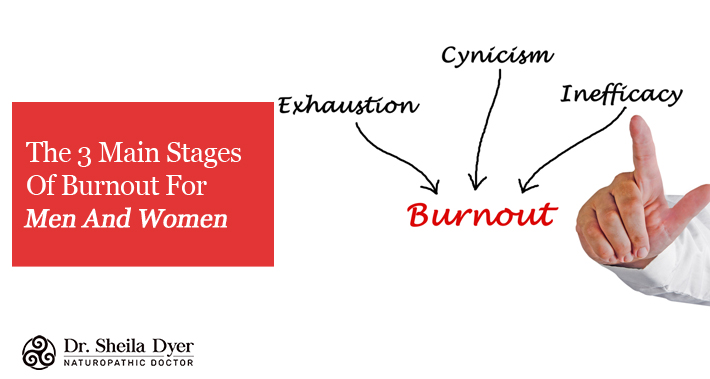Are you going through your days with an increasing sense that they’re getting harder?
Do tasks that used to be a breeze now feel overwhelming and difficult?
Have you found that you’re avoiding friends and family, especially if you sense there might be conflict on the horizon?
All of these scenarios could mean that you’re experiencing burnout.
Burnout is the result of chronic stress, and it can be very difficult to dig yourself out once you’re in it.
I’m Dr. Sheila Dyer, naturopathic doctor, and I offer naturopathic mental health and stress management in Toronto that can help.
Let’s take a closer look at burnout and the potential help there is out there for you.
What Is Burnout?
When your stress levels are out of control and unmanaged, that’s what we mean by burnout.
The term burnout was first coined in the 70s.
At the time it referred to a more social problem, rather than just workplace stress.
Whether your burnout originated at work or with overwhelm in some other area of your life, it can be challenging to deal with.
Burnout is describing a state of chronic stressors, which can be emotional, interpersonal, or physical.
If you feel utterly depleted and like you simply can’t handle anything more, that could be burnout.
It could mean you feel continuously drained without ever feeling relief or an ease of the stress.
The Three Stages Of Burnout
There are three stages of burnout, which present differently in men and women.
Complete lack of energy might be a sign of complete exhaustion, while if you feel like you just can’t care about anything anymore you might be experiencing the cynicism stage.
If you notice a constant sense of lack of accomplishment or like you’ve lost your touch, then you might be in the self doubt phase of burnout.
Let’s talk in more depth about each of these three stages.
1. Complete Exhaustion
This stage may include a feeling of depersonalization, emotional exhaustion, and depletion.
You might feel like you’re constantly drained with no sense of relief from what would usually “charge your battery.”
Paradoxically, you may experience sleep deprivation despite being exhausted.
Things like taking a multivitamin or eating a healthy diet might help, but not as much as they usually do.
You may have so little energy that you feel like you can’t get through the day, and every day feels the same.
What To Do About It
When you’ve reached this stage of burnout, it means you need a break, and quickly.
Do your best to reduce your stressors, and give yourself a chance to decompress.
One of the first things you can focus on when you’re trying to recover from burnout is your sleep.
Improving your sleep hygiene is vital for making sure your overall health is better, which will give you some energy back.
Turning off screens before bed and using natural sleep aids are ways you can improve your sleep hygiene.
You may also want to look into adaptogenic herbs that can help with stress relief.
As well, make sure you don’t have a nutrient deficiency in iron, vitamin D, or vitamin B12, all of which can be linked to lack of energy.
2. Cynicism
Cynicism, which means you’re feeling detached and lifeless, is another stage of burnout.
You may feel flooded with negative thoughts.
It’s like you’ve lost your spark of optimism, and you may continue to depersonalize and experience numbness as your emotional responses are overwhelmed.
During this stage, you may really feel lifeless and like you’re just going through the motions.
What To Do About It
When you’re depersonalizing like this, it’s important to use techniques that will keep you grounded.
Focusing on your physical body can help – observe and concentrate on your surroundings, stomp your feet, or rub your hands together to get a sense of yourself in your world.
Try to open up and confide in those closest to you, especially if you think they might help make the world feel lighter again.
Don’t shy away from going deep when you have conversations with others, as uncovering deep rooted issues may be what you need to move out of the cynicism stage of your burnout.
3. Self Doubt
At this stage of burnout you’ve been feeling run down for so long you might start to blame yourself.
Maybe you feel like you’ve lost your touch and are no longer good at what you’re doing.
In your head, you may have started classifying yourself as a failure because everything feels so difficult to deal with.
What To Do About It
This is again the time to turn toward your supports to get the help you need.
Whether it’s colleagues, friends, or family, you need all the help you can get.
You may want to try to fix up your routine – try to get good sleep and maybe add exercise to try to shake yourself out of this phase of self doubt.
You don’t want to be ruled by negative self evaluation any longer.
Book an appointment with me, Dr. Sheila Dyer, ND – I can help.
How Does Burnout Change Based On Your Gender?
When burnout was studied in men and women, it was found that the stages present in different phases for these two groups.
Women tend to experience emotional exhaustion first, followed by cynicism, and lastly self doubt.
Men, on the other hand, will go through the cynicism stage first, and it will be followed by emotional exhaustion.
Interestingly, it was unusual for men to reach the self doubt stage of burnout – this was found to be unique to women.
How Can A Naturopath For Burnout Help?
While burnout is often linked to workplace stress, that’s not the only cause.
Burnout can also be linked to things like adrenal fatigue, a hormonal imbalance related to your adrenal glands.
As a naturopathic doctor, I can help by talking to you about the symptoms you’re experiencing related to burnout, and helping you find solutions.
One thing we may consider is your vitamin levels.
Chronic stress and malnutrition are often linked.
Calcium, magnesium, and B complex vitamins are all helpful for managing stress, and you might be depleted.
We’ll work to get to the root of your burnout issue so you can start to see the light again.
Book Your Appointment With Dr. Sheila Dyer, ND, Today
It’s never too late to build up your support network and take a look at your holistic health so you can start to feel better.
Book your appointment with Dr. Sheila Dyer, ND, today to get started combating your burnout.
If you have questions about naturopathic medicine, or would like to start with your first consultation, contact me, and let’s book an appointment.
Dr. Sheila Dyer, ND1080 Dovercourt Rd,
Toronto, ON M6H 2X8
(416) 554-5135
► https://g.page/DrSheilaDyerNd
Dr. Sheila Dyer is a Naturopathic Doctor and a practicing registered nurse offering holistic healthcare with a scientific focus

